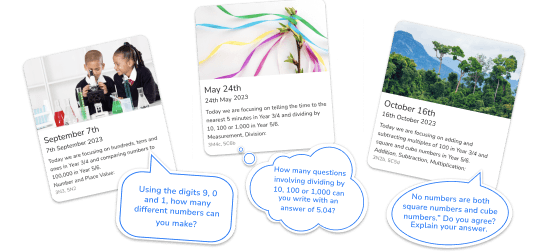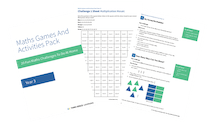Educational Summer Holiday Activities For Kids: Ways To Keep Your Child’s Maths Skills Sharp When They’re Not At School
Here are some fun and educational summer holiday maths activities for your kids to make sure that they don’t forget everything they have learnt over the past year!
Normally the summer holidays come with at least a week or two of warm weather (sorry in advance if we’ve now jinxed it!), and this can present a fantastic opportunity for your child to enjoy some outdoor summer maths activities.
We know that the summer holidays are a time for relaxing and a time that should be spent doing some fun things after a tough school year, but whether you’re taking a trip to Alton Towers or the local park, it’s a good idea to think about how you can incorporate fun summer holiday maths activities into your plans.
They are a great way to subtly keep your child motivated over the long summer break and and avoid the summer slide while still having fun. Children are bound to prefer some fun summer maths activities to the more traditional worksheets, so without further ado, here are 5 summer maths activities you can do with your child over the holidays.
Maths Games and Activities Packs for KS2
20 home learning maths activities and games for every year group from Year 3 to Year 6 - fun, flexible and only involve items you can find in the pack or in your house.
Download Free Now!1. Summer holiday maths games with chalk!
You’ll be relieved to hear that maths games don’t have to be complicated, and all you’ll need for these particular ones is a piece of chalk and some space outside to master maths!
Whilst chalk may sound a little old fashioned, it’s an actually an irreplaceable bit of kit when it comes to holiday maths activities.
It provides your child with the ability to explore maths in a more visual sense.
One thing to note though is that although blank walls and tarmac are usually fine, be sure to check you can draw wherever you choose before going ahead!
If you have a young child, a simple place to start is by drawing numbers. This is a crucial skill top get in place at a young age, and you could turn it into a race to add an element of excitement for your child. Can they draw all the numbers up to 10 faster than you can? There’s only one way to find out…
If your child is slightly older, you could progress to drawing 2D shapes. Enlarging the shapes outdoors really helps children to remember key properties. For example, the number of sides and angles each shape has will be clearly on display through this activity, helping to cement key facts.
Progressing further, you might want to ask your child to draw shapes of a certain size. You can really go wild here depending on how much space you have. You could ask them to draw the largest shape possible in the space you have, and then to measure each side of this shape may keep them entertained for more time than you realise!
If your child is already comfortable with measuring the sides of shapes, they will probably be able to work out the perimeter. Attempting to calculate the area in centimetres or metres will provide an additional level of challenge during this summer maths activity.
If you’re still searching for inspiration for some other outdoor maths activities, take a look at our Fun Times Table Multiplication Hopscotch video below:
Looking for more fun summer holiday activities?
2. Summer holiday angle spotting activity
Asking your child to identify different types of angles is another outdoor learning activity that can be carried out with little planning.
You might know that angles are all around us, but including your child in their identification will help them to appreciate their importance.
The following angles are ones you and your child might be able to identify:
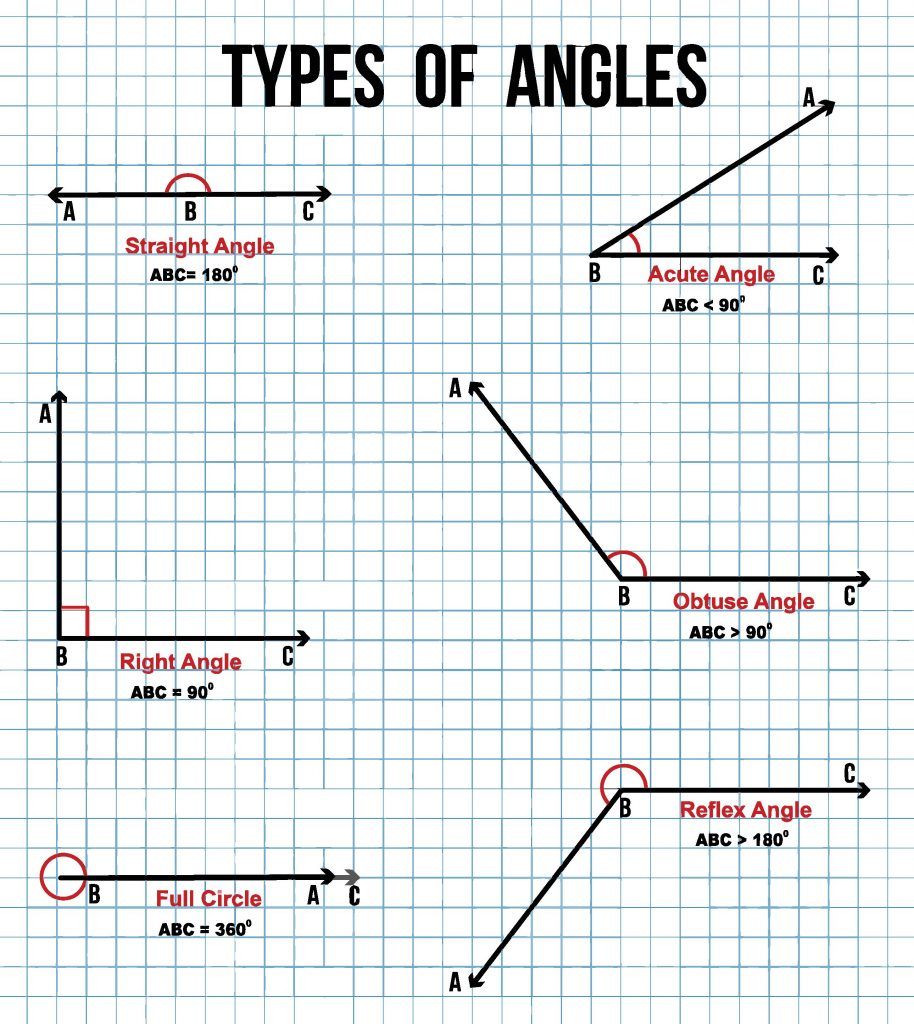
Indeed, many of the sites that you may be planning on visiting during the summer break will have angles at their core. Any building or structure relies on the appropriate combination of angles to keep standing. You may not have a giant protractor, but you won’t need one to identify most of the above angles.
If you have the time, you might want to print out an image of a structure you come across over the break and stick it up somewhere around the house.
Ask your child to label all the acute, obtuse or reflex angles. This will help them to remember the broad shape of different angles and bring maths to life. If for example you are taking a trip down to beautiful Bristol this summer, you could start with the famous Clifton Suspension bridge below:

Angles are all around us, and it is just a case of making them come to life this summer for your child!

3. Summer holiday maths – sneaky surveys
What better way to help your child practise maths than by sneaking some in during car journeys and other downtime in the summer in the form of surveys!
Carrying out surveys in the community is the sort of thing classroom teachers would be doing more of if they had more capacity working within the curriculum.
It’s an outdoor maths activity that can be easily organised, and during the holidays you might have the time to help your child conduct one themselves.
Choose a topic (different types of transport, food tastes, current events – you could cover almost anything within reason) and get out and about to discover the data.
If your child captures all their data in a tally chart first, you could then ask them to draw a bar or pie chart to further represent what they have discovered.
Presenting data they have gathered themselves will be much more fun than using information from textbooks!
Here is an example of what your child could produce:
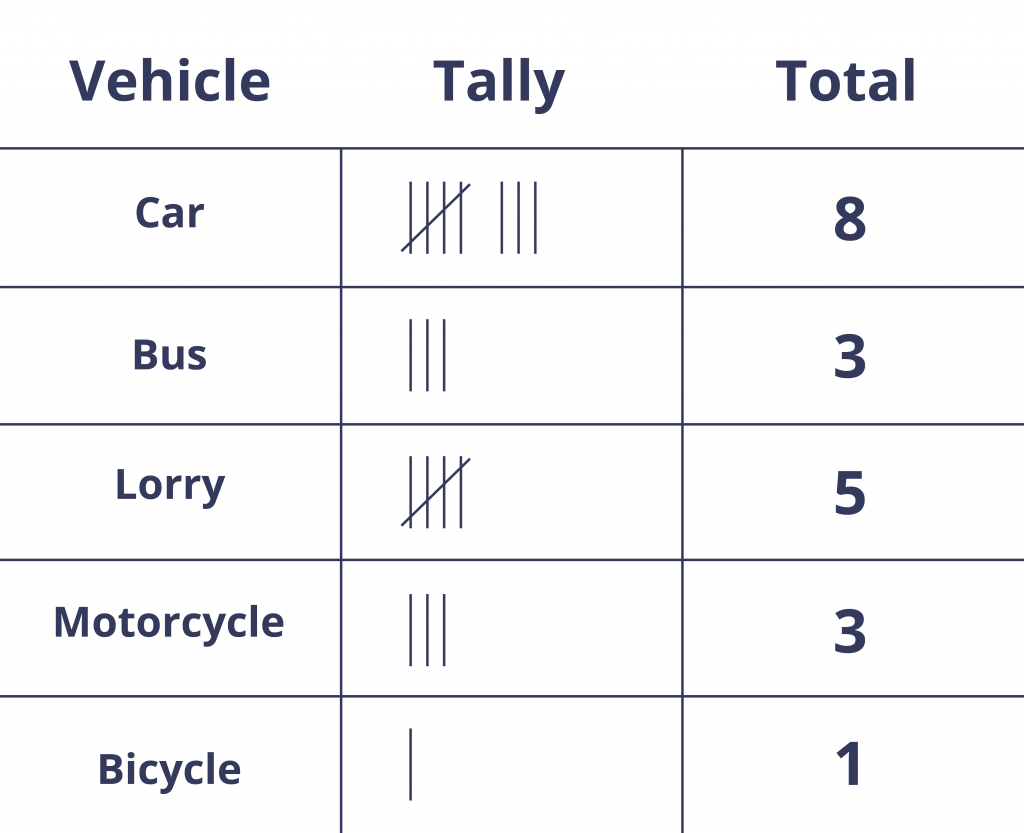
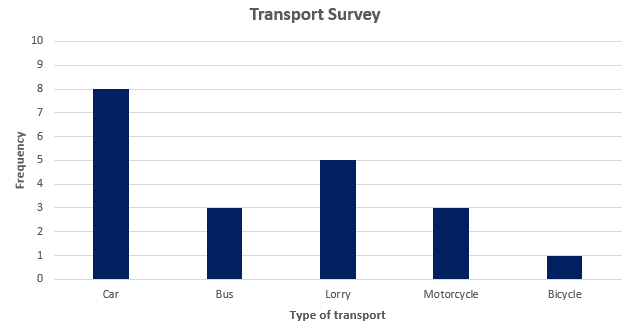
4. Summer holiday activity on making shapes
Another summer holiday activity that requires the minimum of equipment, your child can have a lot of fun making some simple shapes.
To begin, set your child the challenge of making as many 2D shapes as possible using only their bodies.
This outdoor maths activity will be good fun for a period of time before they realise it is actually quite difficult to form a lot of 2D shapes using only their bodies.
You could try making 2D shapes with a group of your children’s friends – great fun, but the challenge will still persist.
For those shapes that require an inhuman levels of flexibility, you could replace children with string, as doing so will enable your child to construct shapes with more accuracy.
A large loop of string will allow them to make a variety of shapes simultaneously.
Going through this process will reinforce the properties of shapes once more.
Plus, what a wonderful way to spend your summer evening!
5. Quick-fire summer holiday maths challenges
One of the easiest summer holiday activities you can use to help your child engage with maths is asking quick-fire questions throughout the break.
Posing questions when they least expect it can actually help to nudge key facts into your child’s long-term memory, as outlined in our blog on the summer slide.
Here are some maths challenges you could try out:
- Use questions based on times tables e.g. 5 x 5, before progressing onto more demanding calculations beyond the 12 times table. If your child gets 5 right in a row, maybe they could win a prize?
- Ask your child to calculate how much change you will get when at the shops, and if they work out the right amount you can add it to their piggy bank (within reason of course…) This blog on how to help your child learn about money could help.
- Use time to stimulate your child’s brain. For example, if the time is currently 10:37, calculating what time it will be in 9 hours and 17 minutes is something even most adults would find difficult!
Bonus summer maths activity: Place value football
For this activity, all you need is a football, cones and some place value knowledge. Find out how to do it in the video below.
If you are looking for more ways to engage children with maths during term time or the holidays, Third Space Learning’s online maths lessons provide 1-to-1 support that’s personalised to children’s needs. Tutors make lessons fun, and match the interests and previous maths experience of the child being taught.
DO YOU HAVE STUDENTS WHO NEED MORE SUPPORT IN MATHS?
Every week Third Space Learning’s specialist school tutors support thousands of students across hundreds of schools with weekly online 1 to 1 maths lessons designed to plug gaps and boost progress.
Since 2013 these personalised one to one lessons have helped over 150,000 primary and secondary students become more confident, able mathematicians.
Learn how the tutoring integrates with your SEF and Ofsted planning or request a personalised quote for your school to speak to us about your school’s needs and how we can help.
